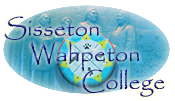Sisseton Wahpeton College
| Type | as an entity of the Sisseton Wahpeton Oyate. |
|---|---|
| Established | 1979 |
| President | Randy Smith, Ph.D |
| Students | 250 (80% Dakota people) |
| Undergraduates | vocational and academic degrees |
| Postgraduates | not available |
| Location |
BIA Rd 700, Agency Village P.O. Box 689, Sisseton 57262, South Dakota, United States 57262 45°33′46″N 97°03′39″W / 45.56271°N 97.06074°WCoordinates: 45°33′46″N 97°03′39″W / 45.56271°N 97.06074°W |
| Campus | urban/suburban reserve on the Lake Traverse Reservation |
| Website | www |
 |
|
Sisseton Wahpeton College was established in 1979 as an entity of the Sisseton Wahpeton Oyate. Located in northeastern South Dakota on the Lake Traverse Reservation, the College serves the Dakota people. SWC has an average enrollment of approximately 250 students, of whom more than 80% are tribal members.
SWC was originally a vocational and technical school; an academic program was added as enrollment climbed. SWC is one of the few post-secondary schools in South Dakota to offer both vocational and academic degrees.
Although SWC is only accredited to offer associate degrees, the College has agreements with several 4-year degree granting institutions that allow SWC students to take much of their course work at SWC or seamlessly matriculate to another institution. The agreement between SWC and Mount Marty College offers SWC students the opportunity to earn a Baccalaureate degree in Business and Tribal Governance, a one of a kind program in the state.
SWC is a member of the American Indian Higher Education Consortium (AIHEC), which is a community of tribally and federally chartered institutions working to strengthen tribal nations and make a lasting difference in the lives of American Indians and Alaska Natives. SWC was created in response to the higher education needs of American Indians. SWC generally serves geographically isolated populations that have no other means accessing education beyond the high school level.
SWC was one of the first tribal colleges to establish an institute for the study and preservation of tribal culture. The college created the Institute for Dakota Studies in 1992. This center's mission is to teach, study and preserve the tribe's unique history and traditions.
The Center for Excellence in Dakota Language, established at SWC in 2005, works with the College's strong Dakota studies and Dakota Language programs to revitalize the Dakota language. Eventually, this program hopes to establish a revitalization model that can be replicated anywhere in Indian Country.
The College has recently experienced a period of facilities and programmatic expansion and one of the final products of this construction boom was Song to the Great Spirit, the new SWC Vocational Education Building. Designed as a facility where students could learn building trades by constructing a single family home inside, the building's unique design makes the SWC campus a local landmark. The building is an example of culturally contextual architectural design and is in the shape of four Indian figures who, with drumsticks raised, are singing a traditional Dakota song using their drum. The building honors SWC's history and the history of the Dakota people. The figures are made of fiberglass and are almost fully functional with two housing stairwells, one the elevator and the other the utility and storage closets. In addition to this new building, the college has almost doubled its square footage with a classroom and office addition and an Early Childhood Education Center addition.
...
Wikipedia
